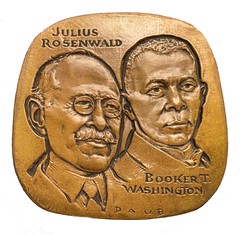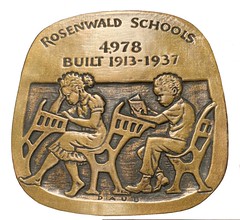
PREV ARTICLE
NEXT ARTICLE
FULL ISSUE
PREV FULL ISSUE
NEW MEDAL HONORS JULIUS ROSENWALDMel Wacks submitted this announcement of the latest Jewish-American Hall of Fame Medal, which includes a discount for E-Sylum readers. Thanks. -Garrett
New Jewish-American Hall of Fame medals honor
Philanthropist Julius Rosenwald Also Feature Black Icon Booker T. Washington The Jewish-American Hall of Fame is celebrating May as Jewish American Heritage Month by issuing art medals honoring Julius Rosenwald, who appears along with his friend and associate Booker T. Washington. These Renaissance-style high relief medals are the 56th in the longest continuing series of art medals in America. No more than one hundred 3 ½ inch bonded bronze medals will be hand made by former U.S. Mint engraver Jim Licaretz and hand-patinated by medalist Eugene Daub. Daub won the American Medal of the Year Award in 2024, and Licaretz won the Award in 2023. The Rosenwald-Washington medals can be ordered for the special price of $160 each by calling the Jewish-American Hall of Fame at 818-225-1348 and mentioning The E-Sylum.
Mel Wacks, Director of the Jewish-American Hall of Fame, says that Julius Rosenwald was born in 1862 just a few blocks from Abraham Lincoln's residence in Springfield, Illinois. By his sixteenth year, Rosenwald was apprenticed by his parents to his uncles in New York City to learn the clothing trades, and together with his younger brother, Rosenwald started a clothing manufacturing company. In 1895, he became a part owner of Sears, Roebuck & Co., and in 1908 Rosenwald was named president. in 1924, Rosenwald resigned the presidency, but remained as chairman; his goal was to devote more time to philanthropy. Booker T. Washington was born a slave on April 5, 1856, in Franklin County, Virginia. Between the ages of ten and twelve, he worked in a coal mine, while attending school. At the age sixteen, Booker T. Washington entered Hampton Normal and Agricultural Institute in Virginia, where his belief was reinforced in an educational system that emphasized practical skills and self-help. In 1880, a bill that included a yearly appropriation of $2,000 was passed by the Alabama State Legislature to establish a school for Blacks in Macon County. Washington was named as principal. By Tuskegee's 25th anniversary, Washington had transformed an idea into a 2,000-acre, eighty-three building campus that, combined with such personal property as equipment, live stock and stock in trade, was valued at $831,895. Tuskegee's endowment fund was $1,275,644 and training in thirty-seven industries was available for the more than 1,500 students enrolled that year.
Booker T. Washington wrote 40 books, including an autobiography titled
A friendship sparked, resulting in the building of nearly 5,000 schoolhouses in Black communities across the South, where existing facilities, in Washington's words, were Wayne Homren, Editor The Numismatic Bibliomania Society is a non-profit organization promoting numismatic literature. See our web site at coinbooks.org. To submit items for publication in The E-Sylum, write to the Editor at this address: whomren@gmail.com To subscribe go to: Subscribe All Rights Reserved. NBS Home Page Contact the NBS webmaster 
|

